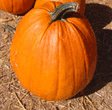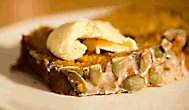Pumpkin seeds Nutrition facts
Pumpkin seeds (pepita) are edible kernels of fruit pumpkin. The seeds, indeed, are concentrated sources of many health-benefiting vitamins, minerals, antioxidants, and essential amino acids such as tryptophan, and glutamate.
Pumpkin fruit is a squash-like gourd in the Cucurbitaceae family of vegetables native to Mexico. Scientific name: Cucurbita pepo. In the Central Americas, hulled and gently roasted pumpkin kernels are popularly known as Pepita.

|

|
 |
| Pumpkin (whole) seeds. Note for whole seeds with ash-white color husk. | Pumpkin kernels. Note for olive green color kernels. | Mature pumpkin fruit. (Photo courtesy: terren) |
Fruit pumpkin is grown usually as a field-vegetable crop. However, in some parts of Central Europe (Styrian provinces in Austria, Slovenia, and Hungary), they are being cultivated exclusively for their kernels at a commercial scale as a major oilseed crop.
Normally, pumpkin fruit is allowed to mature completely in order to gather good-quality kernels. Each fruit may contain up to 250 g cream-white seeds located at its central hollow cavity entangled in mesh-like fibrils.
Pumpkin seeds are semi-flat, and feature a typical ovoid shape with a conical tip. Inside, edible, olive-green kernels are sweet, buttery in texture, and nutty in flavor. Pepitas are enjoyed as a snack and added to desserts and savory dishes.
Health benefits of Pumpkin seeds
Crunchy, delicious pumpkin seeds are high in calories; about 559 calories per 100 g. Also, they are packed with fiber, vitamins, minerals, and numerous health-promoting antioxidants.
Their high calorific value mainly comes from protein and fats. Moreover, pepitas are especially rich in monounsaturated fatty acids (MUFA) like oleic acid (18:1) that help lower bad LDL-cholesterol and boost good HDL-cholesterol levels in the blood. Research studies suggest that the Mediterranean diet that is liberal in monounsaturated fatty acids contributes to preventing coronary artery disease and stroke risk by favoring a healthy blood lipid profile.
Pumpkin seeds carry good-quality protein. 100 g seeds provide 30 g or 54% of the recommended daily allowance of protein. Also, the seeds are an excellent source of amino acid tryptophan and glutamate.
Tryptophan is converted into serotonin and niacin. Serotonin is a beneficial neurochemical often labeled as nature's sleeping pill. Further, tryptophan is the precursor of B-complex vitamin, niacin (60 mg of tryptophan = 1 mg niacin).
Glutamate is essential for the synthesis of gamma-amino butyric acid (GABA). GABA, an anti-stress neurochemical in the brain, helps reduce anxiety, nervous irritability, and other neurotic conditions.
Pumpkin seeds are a very good source of antioxidant vitamin-E; contain about 35.10 mg of tocopherol-gamma per 100 g (about 237% of RDA). Vitamin E is a powerful lipid-soluble antioxidant. It prevents tissue cells from free radical-mediated oxidant injury. Thus, it helps maintain the integrity of mucosa and skin by protecting it from harmful free oxygen radicals.
Pumpkin kernels are also an excellent source of the B-complex group of vitamins such as thiamin, riboflavin, niacin, pantothenic acid, vitamin B-6 (pyridoxine), and folates. These vitamins work as cofactors for various enzymes during cellular substrate metabolism in the human body. Besides, niacin helps in the reduction of LDL-cholesterol levels in the blood. Along with glutamate, it enhances GABA activity inside the brain, which in turn reduces anxiety and nervous irritability.
Furthermore, its seeds contain good amounts of essential minerals like copper, manganese, potassium, calcium, iron, magnesium, zinc and selenium.
Just as in pine nuts, pumpkin seeds too are very rich sources of manganese (provide 4,543 mg per 100 g, about 198% of daily-recommended intake). Manganese is an all-important co-factor for antioxidant enzyme, superoxide dismutase. Therefore, consumption of pumpkin kernels helps develop resistance against infectious agents and scavenge harmful oxygen-free radicals.
Medicinal values of pumpkin seeds.
Research studies suggest that some chemical compounds in pumpkin seeds possess DHEA (Di-hydro-epi-androstenedione) hormone-blocking actions at the receptor levels. Exposure to high DHEA levels may lead to gonadal tumors. Thus, these seeds may cut the risk of prostate and ovarian cancers in humans.
In addition, experimental studies suggest that certain phytochemical compounds in pumpkin seed oil may have a role in the prevention of diabetic nephropathy (diabetic kidney disease).
| Principle | Nutrient Value | Percent of RDA |
|---|---|---|
| Energy | 559 Kcal | 28% |
| Carbohydrates | 10.71 g | 8% |
| Protein | 30.23 g | 54% |
| Total Fat | 49.05 g | 164% |
| Cholesterol | 0 mg | 0% |
| Dietary Fiber | 6 g | 16% |
| Vitamins | ||
| Folates | 58 µg | 15% |
| Niacin | 4.987 mg | 31% |
| Pantothenic acid | 0.750 mg | 15% |
| Pyridoxine | 0.143 mg | 11% |
| Riboflavin | 0.153 mg | 12% |
| Thiamin | 0.273 mg | 23% |
| Vitamin A | 16 IU | 0.5% |
| Vitamin C | 1.9 µg | 3% |
| Vitamin E | 35.10 mg | 237% |
| Electrolytes | ||
| Sodium | 7 mg | 0.5% |
| Potassium | 809 mg | 17% |
| Minerals | ||
| Calcium | 46 mg | 4.5% |
| Copper | 1.343 mg | 149% |
| Iron | 8.82 mg | 110% |
| Magnesium | 592 mg | 148% |
| Manganese | 4.543 mg | 198% |
| Phosphorus | 1233 mg | 176% |
| Selenium | 9.4 µg | 17% |
| Zinc | 7.81 mg | 71% |
| Phyto-nutrients | ||
| Carotene-ß | 9 µg | -- |
| Crypto-xanthin-ß | 1 µg | -- |
| Lutein-zeaxanthin | 74 µg | -- |
Selection and storage

|
| Pumpkin kernel pie. Photo courtesy: kennymatic. |
Pumpkin seeds can be readily available in stores all around the year. You may find whole seeds, hulled, roasted, etc., displayed in the grocery stores. In the Latin Americas, hulled and roasted pumpkin seeds are referred to as pepita.
While buying whole seeds look for uniform, compact, cream-white, or light yellow color seeds that feel heavy in hand and give a good metallic sound.
Avoid thin, small-sized, shriveled seeds as they yield poor-quality kernels. They should be free from cracks, mold, and spots and free of rancid smell.
Whole seeds keep well for a few months placed in a cool dry place. However, hulled pumpkin kernels deteriorate soon if exposed to warm, humid conditions; therefore, should be put in an air-seal container and stored in the refrigerator.
Culinary uses
Whole as well as hulled pumpkin kernels are being used in a variety of recipes worldwide.
Here are some serving tips:
-
Raw kernels can be enjoyed as healthy snacks. Whole seeds can equally be enjoyable when roasted.
Also, the kernels can be salted or sweetened. In Mexico, the seeds are usually toasted and flavored with salt, lime, or chili peppers, and eaten as snacks.
Pumpkin seeds are one of the ingredients in the Mexican mole sauce.
Just like other nuts and seeds, they can also be used in granolas, biscuits, bread, cookies, casseroles, or baked goods.
The seeds are also used in salads especially sprinkled over fruit/vegetable salads.
You may add them to desserts, particularly sundaes, and other confectionaries.
The seeds are frequently added to enrich in meat, poultry, rice, and vegetable dishes.
Pumpkin seed oil is used in salad dressing as well as in cooking. In Austrian-Styria, the oil is mostly used to add to soups and salad dressings along with vinegar, salt, and minced garlic.
Safety profile
Unlike tree nuts allergy, it is rare to find true pumpkin-seeds allergy incidences. However, a few allergic symptoms may appear in some known sensitive persons due to antigenic cross-reactions with some other nuts, seeds, and fruits, especially of Anacardiaceae family such as mango, cashew nuts, pistachio, etc. Persons with a previous history of allergic reactions to these seeds and nuts may, therefore, need to observe caution. (Medical disclaimer).
You may also like to read:-
Pumpkin nutrition facts and health benefits.
≺≺Back to Nuts and seeds from Pumpkin seeds nutrition. Visit here for an impressive list of nuts with complete illustrations of their nutrition facts and health benefits.
≺≺Back to Home page.
Further Resources:
Stanford School of Medicine Cancer information Page- Nutrition Composition of the Pumpkin Kernels- Journal of Horticulture Letters..